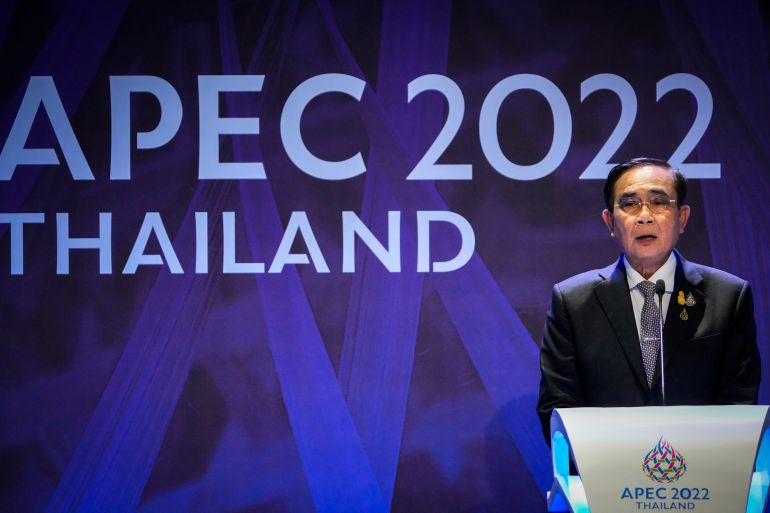‘Most’ Asia-Pacific nations condemn Russia’s war in Ukraine
APEC noted the ‘immense human suffering’ and economic effect of the war despite Russia and China being bloc members.

Asia-Pacific leaders have called for an end to the Russian invasion of Ukraine, saying “most” of them strongly condemned the war and the global economic turmoil it has caused.
A summit statement issued on Saturday at the end of the Asia-Pacific Economic Cooperation (APEC) forum in Bangkok, Thailand, underscored the “immense human suffering” caused by the war and the “significant consequences for the global economy”, including rising inflation, food and energy insecurity and disrupting supply chains.
Keep reading
list of 3 itemsG20 leaders declaration denounces ‘Russian aggression’ in Ukraine
Thai PM calls for sustainable growth as tensions overshadow APEC
"Bangkok Goals on BCG" adopted at the AELM #APEC2022THAILAND
Read here :https://t.co/F4yADxCyZb
Also take a look at the "2022 APEC Leaders' Declaration" here:https://t.co/lASzQqv2iC
— APEC 2022 Thailand (@APEC2022TH) November 19, 2022
Russia and China are a part of APEC, which has 21 members. Beijing has generally refrained from public criticism of Moscow over the war in Ukraine.
The APEC statement was identical to the declaration from the G20 (Group of Twenty) summit last week in Bali, Indonesia which also condemned the war.
It also said that while APEC was “not the forum to resolve security issues, we acknowledge that security issues can have significant consequences for the global economy”.
“There were other views and different assessments of the situation and sanctions,” it noted.
Amid tensions between Russia and the West, Russian President Vladimir Putin did not attend either the G20 or the APEC summits. Foreign Minister Sergey Lavrov went to Bali and Deputy Prime Minster Andrei Belousov to Bangkok.
On the sidelines of the event, US Vice President Kamala Harris exchanged brief remarks with Chinese President Xi Jinping, with the latter saying that he viewed a meeting in Bali with US President Joe Biden as a step towards a “next stage” in ties between their countries.
Relations between the world’s two largest economies have been fraught, with disagreements over trade, human rights and China’s claims over the self-ruled island of Taiwan.
Host and Thai Prime Minister Prayuth Chan-ocha urged the bloc’s leaders to push ahead with APEC’s agenda of promoting free trade in the Pacific region.
“We have to give priority to turning this plan into action,” Prayuth said.
The summits over the past week gave leaders a chance for face-to-face encounters that have been rare in the past two years because of the COVID-19 pandemic.
Both at the G20 and APEC, officials appear to have chosen to agree to disagree about the war. In Bangkok and Bali, countries that refused to condemn the invasion refrained from blocking the release of statements harshly criticising Moscow.
APEC is made of Australia, Brunei, Canada, Chile, China, Hong Kong, China, Indonesia, Japan, Korea, Malaysia, Mexico, New Zealand, Papua New Guinea, Peru, the Philippines, Russia, Singapore, Taiwan, Thailand, the United States and Vietnam.
The US is scheduled to host next year’s summit in San Francisco.